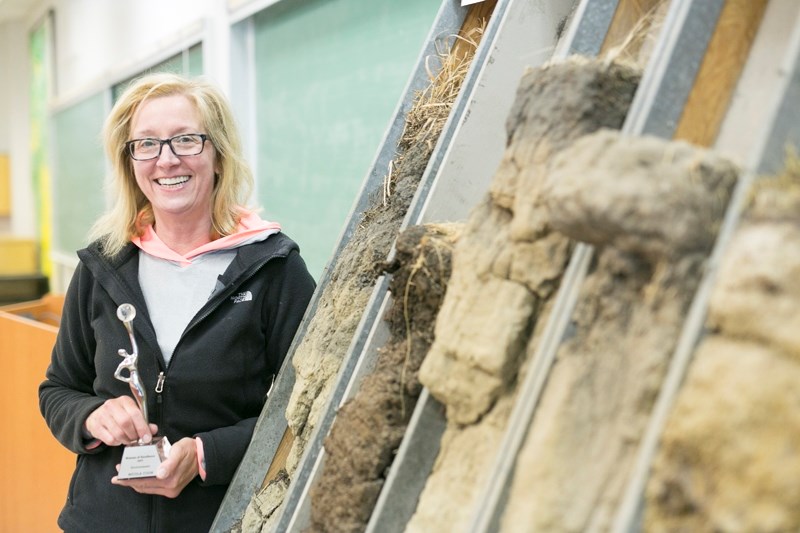It's not really a big secret: Nikki Cook loves soil.
She doesn't deny it.
ìI do love soil,î she said. ìEverybody thinks that soil is just black dirt. And that's it.î
Spend 10 minutes with Cook, and you'll learn otherwise. Dirt is dead. Soil is alive. There are bright red soils, blue soils, pink soils. She describes the way they develop, and how it depends on the rocks, the plant life, the microbes Ö she could go on. Each semester, at Olds College, she does.
Cook teaches everything and anything about soil: formation, properties, distributions, classifications. Her passion for soil has earned her a spot in her students' hearts. And more recently, a shiny new trophy.
The land sciences instructor won a 2017 Women of Excellence award, and was recognized for her environmental work by the Red Deer and District Community Foundation at last week's awards gala (June 7).
TEACHER AT HEART
Barb Mulholland, the dean of agribusiness, land and fashion at the college, made the nomination, saying once they got the OK from Cook, the application came together easily.
ìNikki is at heart a teacher and shepherd for her students. She goes above and beyond her duties,î wrote Mulholland in her nomination.
Mulholland added that Cook's energy and enthusiasm create a positive influence, and her passion for preserving and protecting soil rubs off on others.
ìShe's always saying things like, I had a great day in the field with the students!î said Mulholland. ì(She says) ëI just love soil!' Ö she really does!"
But her love for soil is more than just a penchant for playing in the dirt.
In addition to classroom teaching, Cook has worked as a consultant, researcher, and an educator. She is part of the Canadian Land Reclamation Association, and works with industry on restoring contaminated soil ñ whether by oil or hazardous waste. She participates in annual advisory committee meetings, helping to bring more sustainable practice into effect.
PASSING IT ON
But she says her main passion and focus is learning about the environment, and then passing that knowledge on. According to her students, she's hitting the mark.
ìHer goal is for us to take away as much knowledge as we can,î wrote one of her students, Jenae Doyle, in a letter of recommendation, ìin order to build our success and create a positive impact in our environmental endeavors.î
ìShe is kind and compassionate and genuinely cares about the people around her,î added Doyle. ìI consider myself and my fellow students truly fortunate to have her as one of the people helping to shape our futures as well as the future of our planet.î
A DIRTY LOVE AFFAIR
Cook didn't start off loving dirt. Her first degree was in film and photography.
After hopping between odd jobs, she took a trip to the Philippines, where her brother-in-law was a rice scientist, addressing global hunger.
ìI just loved that he was ñ I don't know ñ affecting the world,î said Cook. ìSo I thought, OK, I am going back to school, and I am going to study natural resource sciences and just see where that takes me."
She began another undergrad at McGill, which morphed into a master's degree, which morphed into a PhD in environmental soil science. In other words, a doctorate in dirt.
"It just seemed really fascinating,î she says. "It started with the geology part ñ you've got these rocks, that turn into soil and it's not renewable. It takes thousands of years to get an inch of soil Ö and so this is going to sound really corny, but in some way, it was as beautiful as artwork.î
"I just discovered the magic of soil!" she said, describing its ability to retain toxic heavy metals so people don't get sick eating food grown in them, and how carbon dioxide stays in the soil, preventing greenhouse gas emissions. ìIt's life.î
INSPIRING AND EQUIPPING
After a stint in academia, then in industry, she landed in Vermillion, at Lakeland College for eight years, and then joined Olds College four years ago.
ìI feel like I can flourish here. I feel like I am given the opportunities to learn everything I need to learn, get out there, into industry, work with people,î she said.
She says that there is a lot of misinformation when it comes to the overlap between industry and environmental sustainability.
"Some people just believe that industry is evil and there's just no redeeming it, like you can't possibly be making money and taking care of the environment,î she said.
If she couldn't say it in so many words, she agreed that in her teaching role she is equipping students to go and affect industry in more sustainable ways.
"It's hopefully, inspiring students to be excellent environmental stewards."
THE CONVERTED MANY
In the meantime, she might be cultivating more than just rich soil in the lab.
"(Students) come in like, ugh, intro to soils? Really?î she says. ìAnd then ñ OK, I am not bragging or anything ñ well maybe I am ñ but I have converted quite a few of them to soils lovers.î
ìAnd it's really cool, because they just get to understand how important soil is, and yeah, it is also beautiful. Like it is crazy beautiful stuff.î
When she thinks back to her brother-in-law in the Philippines, it seems like studying natural resource sciences took her beyond where she hoped. She just wanted to affect the world.
"I think I've surpassed it,î she said. "I am influencing 100 students a year. However little or however much, 100 students go across my path, and we get to talk about land reclamation, soil, the ethical side of all of this."
ìI am really, really happy with what I am doing.î



